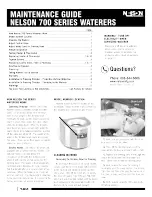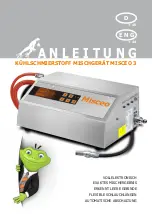
OFITE, 11302 Steeplecrest Dr., Houston, TX 77065 USA / Tel: 832-320-7300 / Fax: 713-880-9886 / www.ofite.com
16
The OFI 175 mL HTHP Filter Press uses two regulators as standard equip-
ment. Both may be operated with Carbon Dioxide (CO
2
) or Nitrogen (N
2
) gas.
1. Concoa Regulator 8051140-00-1: Top or Main Pressure.
a. Maximum Inlet Pressure – 3,000 psi
b. ¼” NPT Connections
c. Single stage regulator
2. Concoa Regulator 8051179-00-1: Bottom or Back Pressure.
a. Maximum inlet pressure – 2,500 psi
b. ¼ “ NPT Connections
c. Single stage regulator
Regulator Safety
1.
Never subject the regulator to inlet pressure greater than its rated inlet
pressure as shown on the regulator body.
2.
Do not allow oil, oil bearing materials, grease, or other combustibles to
contaminate the inside or outside of the regulator, especially where Oxygen
is in use.
3. To minimize heat effects, avoid the use of piping or tubing between the
pressurized cylinder and the regulator. If unavoidable it should be as short as
practical and equipped with a shutoff valve located just before the regulator.
4. The 8051140 regulator has been internally cleaned for Oxygen but it is not
recommended to pressurize HTHP Filtration tests with Oxygen due to its
potentially explosive nature.
5.
Never pressurize a regulator that has loose or damaged parts or is in
questionable condition. Never loosen a connection or attempt to remove a
part until gas pressure has been relieved.
6. Before transporting pressurized cylinders that are not secured on a cart
designed for such transport, remove all regulators and recap the cylinders.
7.
Check the regulator and all connections for leaks after installation and
periodically thereafter. Also check for leaks after any service in which parts or
connections were loosened. Brush with an approved leak detection solution
and bubbles should indicate a leakage.
8. An appropriately sized pressure relief device downstream of the regulator
should be installed in your system to prevent damage to equipment and/or
injury to personnel should an internal failure of the regulator occur.
9. Do not purge oxidizing or flammable gases in the presence of flame, lit
cigarettes, or other sources of ignition or towards people.
















































